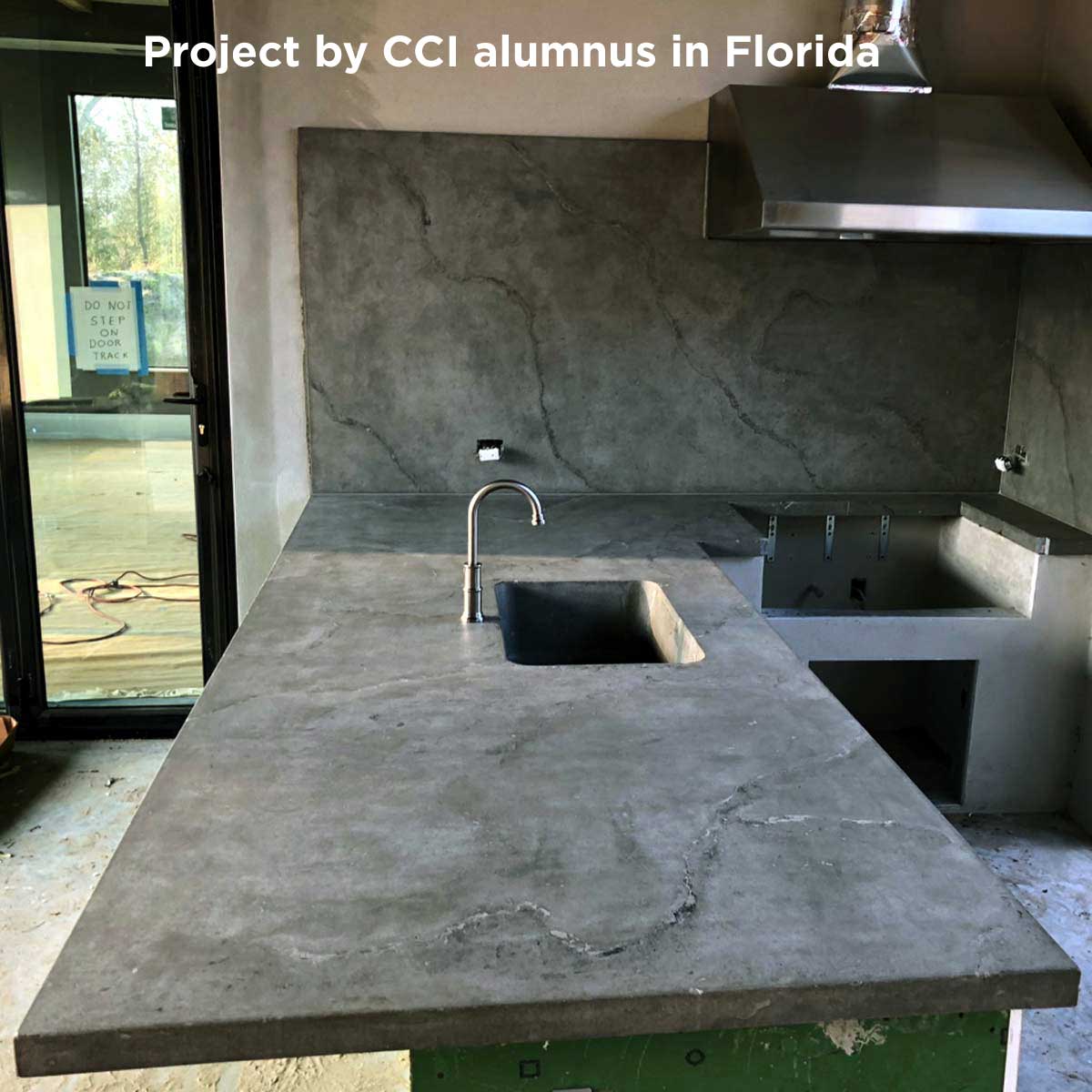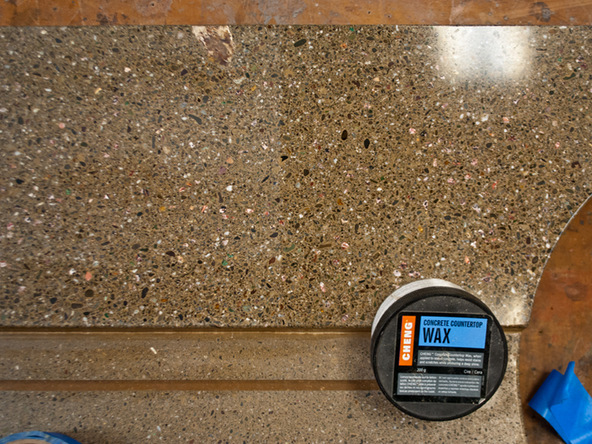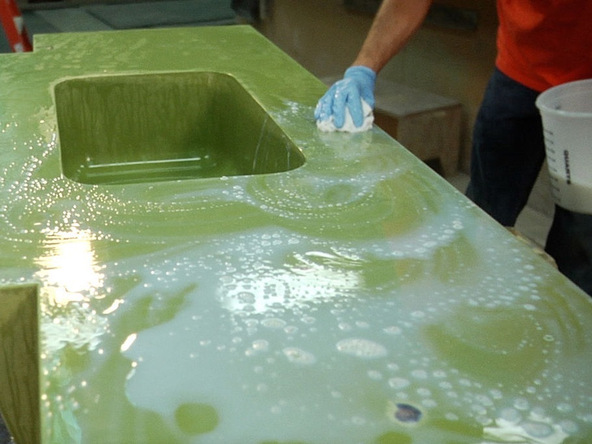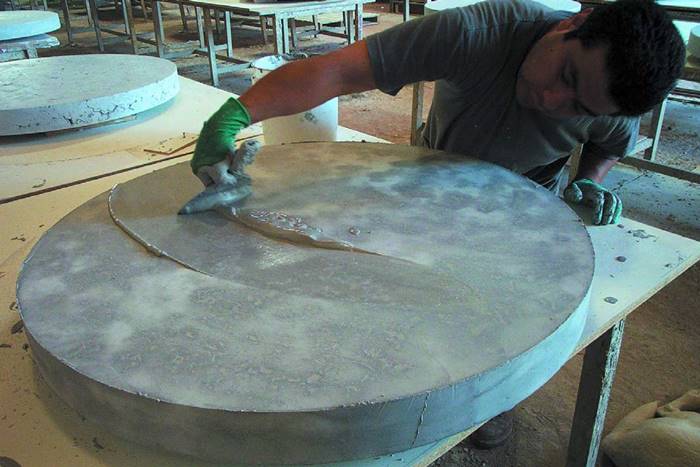Concrete countertops have gained popularity in recent years due to their durability, versatility, and aesthetic appeal. However, to maintain their beauty and performance, proper sealing and waxing are essential. Let’s discuss the importance of sealing and waxing concrete countertops, the different types of sealers and waxes available, application techniques, and common FAQs to help you make informed decisions for your countertop maintenance.
Importance of Sealing: Sealing concrete countertops is crucial for protecting them from stains, moisture, and damage. Concrete is a porous material that can absorb liquids and stains if left untreated. Sealing creates a protective barrier that prevents water, oils, and other substances from penetrating the surface, making it easier to clean and maintain.
Types of Sealers: There are various types of sealers available for concrete countertops, including penetrating sealers, topical sealers, and hybrid sealers. Penetrating sealers penetrate into the pores of the concrete, forming a chemical barrier that repels water and stains. Topical sealers create a protective film on the surface of the concrete, providing enhanced durability and resistance to stains. Hybrid sealers combine the benefits of penetrating and topical sealers, offering both protection and aesthetic enhancement.
Application Techniques: Proper application of the sealer is essential for ensuring optimal performance and longevity. Before sealing, the concrete countertop should be clean, dry, and free of any contaminants. The sealer can be applied using a brush, roller, or sprayer, following the manufacturer’s instructions regarding coverage rates and drying times. It’s essential to apply multiple thin coats of the sealer rather than a single thick coat to ensure even coverage and maximum protection.
Importance of Waxing: While sealing provides protection against stains and moisture, waxing adds an additional layer of protection and enhances the appearance of the concrete countertop. Wax creates a smooth, glossy surface that repels water and makes it easier to clean. Additionally, waxing can help fill in any small imperfections or hairline cracks in the concrete, giving the countertop a more polished and finished look.

Types of Waxes: There are various types of waxes available for concrete countertops, including natural waxes, synthetic waxes, and specialty waxes. Natural waxes, such as beeswax or carnauba wax, provide a warm, natural finish and are environmentally friendly. Synthetic waxes, such as polyurethane or acrylic waxes, offer enhanced durability and resistance to wear and tear. Specialty waxes may include additives such as color pigments or UV inhibitors for additional protection and customization.
Application Techniques: Waxing concrete countertops is a straightforward process that can be done using a soft cloth or applicator pad. Before applying the wax, ensure that the countertop is clean and dry. Apply a thin, even layer of wax to the surface of the countertop, working in small sections to ensure complete coverage. Allow the wax to dry completely before buffing it with a clean, dry cloth to achieve a smooth, glossy finish.
Maintenance Tips: To keep concrete countertops looking their best, regular maintenance is essential. Clean the countertops regularly with a mild detergent and water to remove dirt, grease, and stains. Avoid using abrasive cleaners or scrubbing pads, as they can damage the sealer and wax finish. Periodically reapply the sealer and wax as needed to maintain protection and enhance the appearance of the countertop.

Compatibility: When selecting a sealer and wax for your concrete countertops, it’s essential to choose products that are compatible with each other and with the concrete surface. Using incompatible products can result in adhesion issues, discoloration, or other problems. Always follow the manufacturer’s recommendations and perform a compatibility test in a small, inconspicuous area before applying the sealer and wax to the entire countertop.
Durability: Properly sealed and waxed concrete countertops can be highly durable and resistant to stains, scratches, and heat. However, the durability of the countertop depends on factors such as the quality of the materials used, the application technique, and the level of maintenance. With proper care and maintenance, concrete countertops can last for many years without needing repairs or refinishing.
Cost: The cost of sealing and waxing concrete countertops can vary depending on factors such as the type of sealer and wax used, the size of the countertop, and the complexity of the application. Generally, sealers and waxes are relatively affordable and can be purchased at hardware stores or online retailers. However, investing in high-quality products and professional installation may result in higher upfront costs but can provide long-term benefits and savings.
Frequency of Sealing and Waxing: The frequency of sealing and waxing concrete countertops depends on factors such as the level of use, exposure to moisture and stains, and the type of sealer and wax used. As a general rule, it’s recommended to reapply the sealer every 1-3 years and the wax every 6-12 months to maintain protection and appearance. However, it’s essential to monitor the condition of the countertop and reapply the sealer and wax as needed.
Resistance to Heat: Sealed and waxed concrete countertops are generally resistant to heat and can withstand temperatures of up to 300-500 degrees Fahrenheit. However, it’s essential to use trivets or hot pads to protect the countertop from direct contact with hot pots, pans, or appliances, as prolonged exposure to heat can damage the sealer and wax finish.

Repairability: One of the benefits of concrete countertops is their repairability. If the sealer or wax becomes damaged or worn over time, it can be easily repaired or refinished to restore the appearance and protection of the countertop. Minor scratches or blemishes can be buffed out with fine sandpaper or a polishing compound, while more significant damage may require reapplication of the sealer and wax.
Environmental Considerations: When selecting sealers and waxes for concrete countertops, consider their environmental impact. Look for products that are low in volatile organic compounds (VOCs) and environmentally friendly. Water-based sealers and waxes are a more sustainable option than solvent-based products and are safer for both the environment and your health.
Professional vs. DIY: While sealing and waxing concrete countertops can be done as a DIY project, hiring a professional installer can ensure proper application and long-lasting results. Professional installers have the necessary skills, tools, and expertise to prepare the countertop surface, apply the sealer and wax correctly, and achieve a flawless finish. Additionally, professional installation may come with warranties or guarantees for added peace of mind.

How often do I need to seal and wax my concrete countertops?
It’s recommended to reapply the sealer every 1-3 years and the wax every 6-12 months to maintain protection and appearance, although frequency may vary depending on usage and conditions.
Can I use any sealer and wax on my concrete countertops?
It’s essential to choose products that are compatible with each other and with the concrete surface. Always follow the manufacturer’s recommendations and perform a compatibility test before application.
Are concrete countertops resistant to heat?
Sealed and waxed concrete countertops are generally resistant to heat and can withstand temperatures of up to 300-500 degrees Fahrenheit. However, it’s essential to use trivets or hot pads to protect the countertop from direct contact with hot items.
Can I repair damaged sealer or wax on my concrete countertops?
Minor scratches or blemishes can be buffed out with fine sandpaper or a polishing compound, while more significant damage may require reapplication of the sealer and wax to restore the appearance and protection of the countertop.
Is professional installation necessary for sealing and waxing concrete countertops?
While DIY application is possible, hiring a professional installer can ensure proper preparation, application, and long-lasting results. Professional installation may come with warranties or guarantees for added peace of mind.

Cheng Concrete Concrete Countertop Sealer – 4L

Sealing Concrete Countertops FAQs CHENG Concrete Exchange

DIY Concrete Counters: Sand, Seal, Wax, and Enjoy Imperfectly

How to Choose the Best Concrete Countertop Sealers – Concrete Decor

Related articles:
- Concrete Countertop Overlay
- Black Concrete Countertops
- Marble Look Concrete Countertops
- Light Grey Concrete Countertops
- Concrete Countertop Design Ideas
- Light Colored Concrete Countertops
- Epoxy On Concrete Countertop
- Concrete Countertops Designs
- Concrete Countertops That Look Like Wood
- White Concrete Countertops